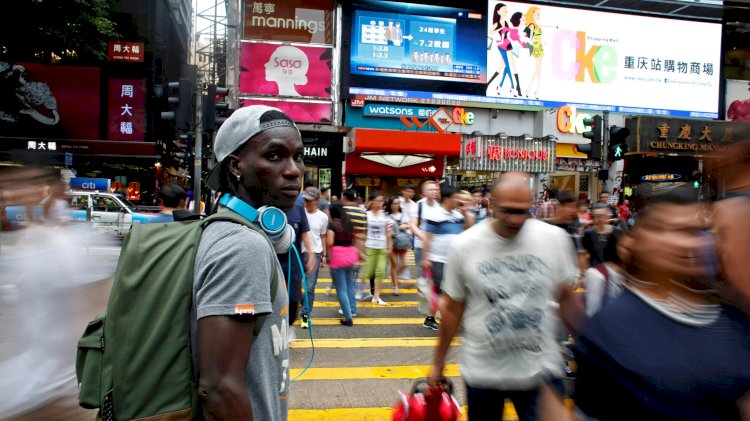African Countries Are Evacuating Some Students From China Over Coronavirus, But Most Hesitate
The problem for many countries, particularly those in sub-Saharan Africa has been a lack of financial resources, notes Hannah Ryder of Beijing-based Development Reimagined.

As the Wuhan, China-originated Novel Coronavirus outbreak worsens, claiming 3,000 lives worldwide, governments in sub-Saharan Africa are finally taking steps to repatriate students in Wuhan. But several key countries remain hesitant worried about the potential for an outbreak at home.
African students who are stranded in Wuhan in particular have been appealing to their governments to help them get back home from a city which has been on lockdown for several weeks now as authorities try to curtail the transmission of the virus.
There has been a rapid growth in the number of African students across China both in the mainland and Hong Kong as the Chinese government has deepened economic and cultural ties with African countries over the last two decades.
This has included an increase in scholarships offered so much so China has overtaken the UK and US as the top destination for students from anglophone African countries. There were nearly 5,000 African students in Hubei province, where Wuhan city is located.
South African, Ugandan and Kenyan students among others in Wuhan have been rallying on their government for evacuation since the onset of the coronavirus’ spread.
Last month, a number of South Africans rallied together, created a petition on Change.org, garnering a total of 720 signatures. So far nine African countries have evacuated students from Wuhan including Algeria, Egypt, Libya, Mauritius, Mauritania, Morocco, Seychelles, South Africa and Tunisia.
The problem for many countries, particularly those in sub-Saharan Africa has been a lack of financial resources, notes Hannah Ryder of Beijing-based Development Reimagined.
“They don’t have funds to charter planes or put their citizens in quarantine, but they also don’t have enough resources in China to really look after their citizens in lockdown conditions,” says Ryder.
South Africa’s health minister Zweli Mkhize said last week 151 South African citizens in Wuhan “have indicated they want to be repatriated”. But the country’s health ministry wants to only bring citizens home without increasing the risk of infection within the country.
The ministry has developed plans for a 21-day quarantine for all returned nationals. The process will be carried out over a period of 10 days by South Africa’s military.
However, several African nations have been staunch in their refusal to bring nationals home. Inadequate health care systems and imperfect information have been a major factor in fueling this hesitation.
Kenya, East Africa largest economy, has only 1 doctor per 5,000 citizens and spends around 5.7% of its GDP on healthcare spending, well below the global average.
READ ALSO:
Coronavirus: 'Dirty Banknotes May Spread Coronavirus'- WHO Warns
Even if healthcare systems were up to par, researchers are still unsure of how to treat and contain the virus.
On Thursday, Ugandan Health Minister Jane Aceng told parliament the nation would not be repatriating its estimated 67 Ugandan students in Wuhan. “ From the public health point of view, it is safer to keep the persons in Wuhan city…countries are strongly advised to assess their capacity to handle the outbreak bearing in mind that repatriation of persons from Wuhan city into the country may be introducing the virus into the country,”, said Aceng.
Ugandan students have made their desire to come home clear. With reports of food shortages and overcrowded hospitals students are growing fearful of what’s to come.
Last month while in Washington DC, Kenyan president Uhuru Kenyatta made promises to evacuate citizens from Wuhan. To date, no citizens have been evacuated by the Kenyan government.
Like Uganda, Kenya has claimed its weak healthcare system is behind its caution. Despite these claims, Kenya resumed flights from China on Feb. 26, a China Southern flight with 13 Kenyans and 198 Chinese nationals landed at Nairobi’s JIKA.
But the government was forced to reverse that decision a few days later after a court ordered the suspension of flights for 10 days, during which time the state has been ordered to develop a “contingency plan on the prevention, surveillance and response to coronavirus”.
The initial decision to allow flights from China had infuriated many Kenyans “Does Uhuru love this country because, if he did, no Chinese flight would be allowed to land in Kenya as long as the Coronavirus remains a threat. Our health system can’t handle a Coronavirus outbreak.” tweeted, well-known Kenyan photo-journalist and activist Boniface Mwangi.
Ghana has not ruled out the evacuation of its citizens from China, but has not yet announced plans to do so. Reports from Wuhan have emerged claiming that some of Ghanaian students in Wuhan were at risk of starvingduring the lockdown.
The National Union of Ghana Students (NUGS) called for the immediate evacuation of Ghanaians in Wuhan.
“If it is indeed money dictating the differences between Africans remaining thousands of miles from home under challenging lockdown conditions and those that can quarantine for 14-21 days and be reunited with families and friends soon after, that’s a sad state of affairs,” says Development Reimagined’s Ryder.
Public health analysts believe the solution for East and West African countries might be working together to evacuate and quarantine citizens upon their return.
Though some countries may struggle to deal with coronavirus cases individually, resource and information sharing might offer added support, they argue.
During the Ebola epidemic lack of communication between West African governments aggravated Ebola’s spread. Having learned from the epidemic, a number of African governments have invested in National Public Health Institutes that have strengthened the capacity for “outbreak response”.




































